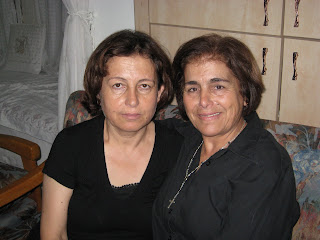


Kahlil and Tarris Musallam
Tarris Musallam and Georgette Kasiss
Gate in Wall
Palestinian Christians: A Family on Star Street in Bethlehem
A chance meeting on Star Street in Bethlehem brought us into the home of Kahlil and Tarris Musallam. Merriam Mankga, another Ecumenical Accompanier, and I had been touring the old city and were taking the Star Street short cut back to the EA residence. The Musallams wanted to show us the guest room they have to rent. As the conversation continued, mostly with Kahlil who speaks some English, they traced ten years of struggle with the Israeli government over the building of the wall before losing their business five years ago. Kahlil and Tarris owned a restaurant near the traditional site of Rachel’s Tomb on Hebron Road, a site important to both Muslims and Jews.
Hebron Road, we are told, has been a busy commercial area and a thriving neighborhood. Today many of the store fronts are shuttered but remain beside the road as a reminder of a busier time. Other shops, like the Musallam restaurant named Tomb Rahel, disappeared within a double line of concrete slabs surrounding the Tomb, making them unavailable to their owners. A grocer whose store still serves the neighborhood, but at a 25% reduced rate of business, said that over 80 businesses were lost to the construction of the wall on this street.
To understand what losing the restaurant meant to Kahlil, Tarris’ sister Georgette described at a later meeting with me this incident. For about six months after the wall cut Kahlil off from his restaurant, a military officer allowed him to come each day, knock on the gate closest to his business, and be admitted for ten minutes to visit the restaurant site. Five years later, he walks daily to this same gate and then turns back to attend mass at St. Catherine Roman Catholic Church. For Tarris and Kahlil the shock of losing their restaurant had been preceded by the death of their teenage son in a car accident.
Today Kahlil’s health prevents him from working and he worries about finances. Tarris works part time as a monitor on a bus taking children to a private school. Star Street is some distance from the Hebron Road neighborhood where they once had their restaurant. Tarris returns to attend a women’s group at the Sumud House, which is affilated with Pax Christ International and locally with the Arab Educational Institute. The Institute promotes understanding among all three religions, Islam, Christianity and Judaism, by providing programs for adults, youth and children. Here Georgette sings in a women’s choir whose program focuses on the traditional Palestinian songs.
Over a meal prepared by Tarris of traditional Palestinian food, she and Georgette talked about their lives. Tarrir worries for her husband’s health and their financial needs. This includes the repayment of loans used to purchase the house next door which belonged to a relative. He was approached by a Muslim who wanted to buy the house. Tarris and Kahlil borrowed money to buy the house. This transaction points up the concern by some in the Old City to keep the real estate with Christian owners. At one time Bethlehem was predominantly a Christian community but according to a 2007 study the city’s Christian population is 28.26% of a total population of 25,266. ( 1)
The continuing decline in economic opportunities is a major reason given by Palestinians, after freedom and security, for considering emigration.(2) The Christian population feels the loss keenly. Under Israeli occupation access and movement are continually changing, not by a legislative process but by military decree. Better paying jobs in Israel are limited to West Bank Palestinians by a permit system. Georgette described how one religious leader had an apartment building built for Christian young adults. The hope was to encourage them to stay in the area by removing one obstacle to finding a secure living.
Georgette nears retirement as a nurse at the Caritas Baby Hospital but there is no pension or social security in the West Bank. For forty years she has cared for family and worked in the health care profession, generously spending her resources where she saw the need. Now she and other retirees face the future without any government support. Nor is there compensation for loss of property or healthcare for those suffering from the consequences of military oppression. As Georgette says, to the nodding agreement of Tarris, “We suffer every day, every day.”
A postscript: Kahlil died on Wednesday, October 6, 2010, from injuries when he fell on his way home from church. He managed to reach home and then was admitted to a hospital in Hebron.
(1) 2008 Palestinian Christians Facts, Figures and Trends, Diyar (publisher), p.7.
(2) Ibid, p.35.
EAPPI-US and Global Ministries of the United Church of Christ and the Christian Church (Disciples of Christ) have sent me as an Ecumenical Accompanier to serve with the World Council of Churches’ Ecumenical Accompaniment Programme in Palestine and Israel (EAPPI). The views contained herein are personal to me and do not necessarily reflect those of my sending organizations or the WCC. If you would like to publish the information contained here (including posting on a website), or distribute it further, please first contact US Coordinator Ann Hefften (eappi2008@gmail.com) or the EAPPI Communications Officer (eappi-co@jrol.com) for permission. Thank you.
No comments:
Post a Comment